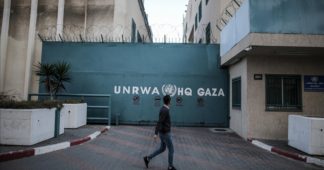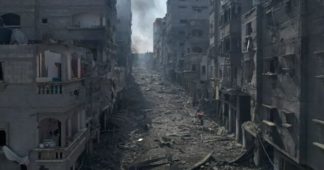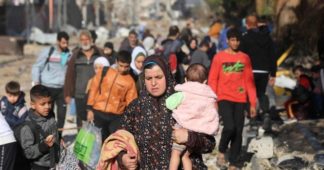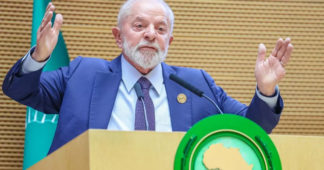By Lubna Masarwa
Those of us who live in the land between the river and the sea go to sleep with one drama reverberating in our minds, only to wake up confronted by another.
On Monday, 92 members of Israel’s parliament, the Knesset, passed two laws banning the United Nations Relief and Works Agency for Palestinian refugees (Unrwa).
It was an act that seeks to deprive three million people in Gaza, the occupied West Bank and occupied Jerusalem of all their schools, primary health care, pharmacies, rubbish collection and many other essential services.
But in a time of war, the ban on Unrwa threatens the whole system of international aid in Gaza as the UN agency provides the infrastructure of drivers, lorries and warehouses on which all else rests.
On Tuesday, news also emerged that over 1,000 people had been killed in Jabalia.
Clearly, there is no rest from the occupation.
The vote in the Knesset represented the entire spectrum of Jewish Israeli politics.
No-one can blame a prime minister or a government cowering behind the extreme-right. It represents all shades of Israeli politicians, and therefore Israel as a whole bears responsibility for a measure of such extreme consequences.
I found it fascinating how successfully they made the ban look like a reaction to 7 October, after claims that Unrwa stand took part in the Hamas attacks, claims for which Israel has yet to provide any proof.
One of the proposers of the bill, Canadian born Sharren Haskel, of the National Unity Party, and once the youngest member of the Knesset said: “There is no country in the world where employees of an international organisation would participate in the massacre of its citizens, and the organisation would exist on its soil even one more day.”
Haskel is the most active member in the Knesset on this issue. She founded the Unrwa reform initiative. When former president Donald Trump cut the agency’s funding, Haskel campaigned around the world to cut more of it.
MK Boaz Bismuth, a former journalist and now a Likud member, said: “UNRWA equals Hamas, period.” And yet everyone who has followed this issue knows that the bid to ban Unrwa has nothing to do with Hamas.
The first attempts to ban Unrwa began at least two decades ago when Unrwa built a complex in Jerusalem. In 2004, MK Nissan Salominski suggested laying siege to the building: “the UN feels as if they are the leaders of the world.”
The so-called centre and left are all part of the same chorus. When he entered politics in 2012 Yair Lapid told Channel 7: “There is no right of return. At first they talked about the refugees of ’48. Why should the Palestinians be the only nation in the world that has second-generation refugees?”
Unrwa’s right to exist was questioned again in 2021, when the Mayor of Jerusalem Nir Barat proposed a bill to remove the UN agency from the city.
Unrwa is being banned because it is the only agency that recognises Palestinian refugees and the right-of-return of their descendants.
Erase Unrwa and you have no refugee problem. Erase the refugees and no-one has a right of return, except of course Jews.
So Aida Tourma-Suleiman, a Palestinian MK from Hadash was more to the point when she addressed the central issue in this move: that Israel wants to banish refugees while doing everything it can to create more of them.
“No Palestinian wants to be a refugee, she said. “The State of Israel is adding hundreds of thousands more to the number of Palestinian refugees, 90 percent of the residents of Gaza have become refugees.”
Siege will become airtight
Ahmad Tibi, leader of the Ta’ al party wrote on X that the laws denying the rights of Palestinian refugees “is part of the broader refusal to recognize the Palestinian people.”
As has become common practice, Benny Gantz’s party had no hesitation choosing sides between the Jewish and Palestinian sides in this nakedly sectarian debate.
“In the choice between [Ahmed] Tibi and Bibi [Prime Minister Benjamin Netanyahu] – we will put the good of the state before any consideration and continue our efforts to topple the government,” it said in a statement.
Moments like these should be recorded by those in the west who pretend that a post Netanyahu era dominated by Gantz would lead to the creation of a Palestinian state. It would not.
For most MKs who voted for the bills, the fact that the world was telling them not to, was reason enough to do it. Merav Ben-Ari of the Yesh Atid saw the passage of the laws as an important moment of national unity.
But for each and every Palestinian these bills spell disaster. “I think the entire aid ecosystem in Gaza will collapse,” aid group Action for Humanity’s Charles Lawley told MEE. “The quality of life will deteriorate to medieval levels if this goes ahead,” he said.
I walked with Suhel Sleman, a Palestinian activist through Nur Shams refugee camp after a bulldozer had destroyed its only medical clinic. “If Israel doesn’t want to collaborate with one of the UN organisations, it should be expelled from the UN,” he told me.
Political analyst Ameer Makhoul saw in the ban a fear of being held legally accountable for the fate of the refugees. This could be exploited by Palestinians and Arabs. The fate of the refugees could, he said, become once more an international issue and a point of pressure on Israel.
But for now the Palestinians have to survive the present. When the ban goes into effect Israel will stop anyone related to Unrwa or any employee from going through its border crossings and checkpoints.
The siege on all Palestinians villages and towns will have become airtight.
Middle East Eye
We remind our readers that publication of articles on our site does not mean that we agree with what is written. Our policy is to publish anything which we consider of interest, so as to assist our readers in forming their opinions. Sometimes we even publish articles with which we totally disagree, since we believe it is important for our readers to be informed on as wide a spectrum of views as possible.











